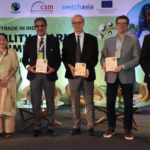Empowering Farmers, Communities Through Sustainable Practices
In India, the participation of Indian women is 75 per cent in the production of major crops, 51 per cent in post-harvest work, 79 per cent in horticulture and 95 per cent in animal husbandry and fisheries, the Indian Council of Agricultural Research (ICAR) research has revealed
Women in India contribute significantly to agriculture, with 75 per cent participating in crop production, but gender disparities persist, highlighting the need for sustainable practices and greater gender equality in the sector.
In India, the participation of Indian women is 75 per cent in the production of major crops, 51 per cent in post-harvest work, 79 per cent in horticulture and 95 per cent in animal husbandry and fisheries, the Indian Council of Agricultural Research (ICAR) research has revealed.
While speaking at an event organised by Fairtrade India, industry experts shed light on India’s agriculture sector and how the country can empower its farmers throw sustainable practices amid growing concerns of climate change.

“ The importance of multi-cropping system, and its nutritional benefits. With women contributing 70 per cent of the labour in agriculture, this approach allows them to cultivate pulses for both personal consumption and additional income, reducing the need to purchase them separately,” emphasised Nanda Kumar Rajagopalan, Chief Executive Officer, Chetna Organic Agriculture Producer Company.
Promoting sustainable farming goes beyond innovative techniques; it involves providing technical training to farmers. “Initiatives encompass technologies like drones for farm mapping and the utilisation of sensors for precision farming. Natural farming, favored for its economic viability, replaces chemical fertilisers with locally available resources like herbal extracts and natural manures, benefiting both the soil and cost-effectiveness,” explained Nina Patil, a sustainable agriculture strategist from Vinifex Agro Producer Company.
However, despite their significant contributions, studies reveal ongoing gender disparities in agriculture. Research from the National Council of Applied Economic Research (NCAER) disclosed that only 12 per cent of women are involved in decision-making in agricultural activities. Additionally, women’s wages in agricultural work are 24 per cent lower than those of their male counterparts, as indicated in a study by the International Labor Organisation (ILO). Access to vital agricultural resources such as land, credit, and technology also remains limited for women, according to a study by the Food and Agriculture Organization of the United Nations (FAO).
These gender disparities are not unique to India and echo in farming communities worldwide, often characterised by patriarchal structures. “The central issue of gender justice, attributing it to historical burdens rather than inherent characteristics of farming communities. While women traditionally held significant roles in managing homestead farming economies, market forces have marginalised them, making men intermediaries between the market and the farm. Achieving gender equality remains a pivotal challenge in advancing sustainability within the agricultural industry,” said Tomy Mathew, founder and member of Fair Trade Alliance Kerala (FTAK).










































































































































































































































































































































































































































































































































































































































































































































































































































































































































































































































































































































































